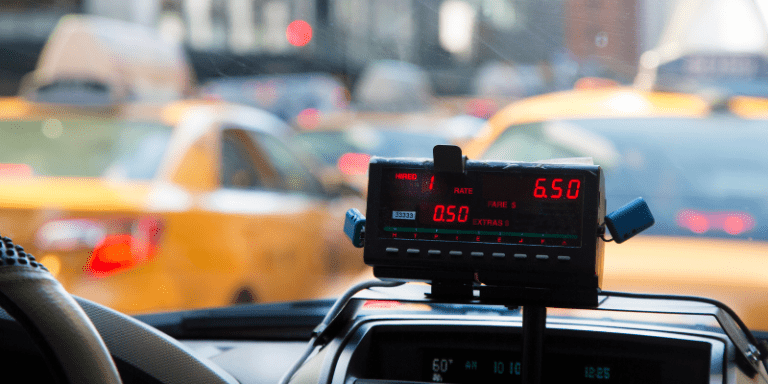Taxi fares in Barcelona for 2024: Complete Guide and Updated guide

Barcelona is a vibrant and lively city, where taxis are a comfortable and reliable way to get around. In this article, we offer you a detailed guide to Barcelona's official taxi fares for 2024, designed to keep our customers well-informed and prepared to plan their journeys efficiently.
With an update that aims to balance operating costs with quality service, the new fares incorporate significant adjustments. Here you'll find everything you need to know about fares, timetables and supplements, as well as useful tips to help you enjoy your transport experience.
Breakdown of Rates by Hours and Days
Day Fare (T-1): Weekdays from 8:00 to 20:00
During daytime hours, taxis charge Fare 1 (T-1), which is ideal for quick trips in the city centre or to nearby neighbourhoods. This fare is perfect for those who use taxis as their main means of transport on working days.
- Lowered flag: 3,25 €.
- Price per kilometre: €1.19
- Waiting time: 22,50 €/hour
Night and Weekend Tariff (T-2)
If you travel at night or on weekends, Fare 2 (T-2) applies. This fare includes a reasonable surcharge to cover operational needs at peak times.
- Lowered flag: 4,20 €.
- Price per kilometre travelled: €1.41
- Waiting time: 24,50 €/hour
Closed Price Tariff (T-3)
Barcelona also offers a fixed-price tariff for services contracted through official apps. This guarantees transparency and allows users to know the exact cost before starting the journey.
Tarifa Fija Aeropuerto – Moll Adossat (T-4)
The connection between El Prat Airport and Moll Adossat, the main port for cruise ships, has a fixed fare of €39, ensuring convenience for international and local travellers.
Supplements and Additional Charges
Origin or Destination Airport Surcharge
- Additional cost: 4,50 €.
Supplement for Departure from Main Stations
Includes stations such as Sants and Estació del Nord, with a charge of €2.10.
Supplement for Large Capacity Vehicles
For large groups, taxis carrying 5 or more passengers apply an additional charge of €4.
Supplement on Special Nights
During Christmas Eve and New Year’s Eve, taxis charge a supplement of 3.50 €.
Tips for Users
How to Request a Taxi in Barcelona
You can book a taxi from our website.
Accepted Payment Methods
Most taxis accept cash and credit cards. In addition, some vehicles also allow mobile payments.
Recommendations for Safe and Comfortable Travel
- Make sure that the taximeter is switched on at the start of the journey.
- Check the rates inside the vehicle to confirm that the correct rates apply.
- Keep the receipt at the end of the trip; it is useful for any claims.
Comparison of Rates with Previous Years
Taxi fares in Barcelona have undergone adjustments over the years, reflecting economic and operational changes. In 2023, rising fuel prices and maintenance costs prompted a 3% revision in fares for 2024.
Check the rates inside the vehicle to confirm that the correct rates apply.
For example:
- The daytime fare increased from €3.15 in 2023 to €3.25 in 2024, while the night-time fare increased from €4.10 to €4.20.
- The cost per kilometre, both day and night, rose on average by €0.02, a moderate figure compared to the increase in the general cost of living.
Although these increases could be perceived as an additional burden for users, taxis remain a convenient and efficient option, especially when compared to the total cost of alternatives such as car rental or the use of mobility platforms at night time.
Impact of the New Tariffs on Users and the Sector
The fare increase aims to ensure the viability of the service, benefiting both users and drivers. For passengers, the fares reflect a commitment to service quality, maintaining high vehicle and safety standards.
In the industry, these upgrades support drivers in the face of increased operating expenses, including fuel, technical checks and the adoption of technologies such as journey management applications and digital payment methods.
In addition, the introduction of transparent and closed fares, together with improvements in regulation, positions the taxi as a strong competitor to shared mobility platforms, ensuring trust and loyalty among users.
Conclusion
Knowing the taxi fares in Barcelona for 2024 is essential to optimise your journeys in the city. Whether you’re heading to the airport, the port or simply getting around the city centre, being informed will allow you to enjoy a reliable and comfortable service.
If you are looking for more information or want to book a ride, Taxi Ride Barcelona is here to help you, making your transport experience safe, efficient and hassle-free!






